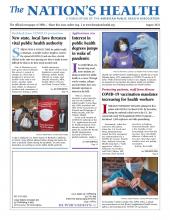
Workers at a Lexington-Fayette County, Kentucky, syringe exchange program kept pace with demand during the pandemic.
Photo courtesy Lexington-Fayette County Health Department
Workers at a syringe exchange service at the Lexington-Fayette County Health Department see hundreds of people each month of all races, ethnicities and economic backgrounds.
The broad demographic suggests how widespread injection drug use has become in the county, state and in the U.S. in general. During the COVID-19 pandemic, demand for clean syringes increased, and the health department service kept pace.
When the service opened in September 2015, only a handful of people took part each week. But recently, an average of 1,500 people arrive each month to pick up sterile needles and dispose of used ones. Dirty needles are common vectors for transmitting HIV and hepatitis C when shared.
The most common drugs injected in the county are cocaine, methamphetamine, and heroin and other opioids, according John Moses, team leader of the department’s syringe exchange services.
Such services reduce the risk of HIV and hepatitis C infections by 50%, according to a study by the Centers for Disease Control and Prevention. Moses said the county has seen similar reductions since the local program launched.
Syringe exchange services also make sense economically. HIV can cost a health care system $400,000 over a patient’s lifetime, and hepatitis C can run around $100,000 in expenses, Moses told The Nation’s Health. Syringes cost about 10 cents each.

Syringe exchange services have been shown to reduce HIV and hepatitis C spread by 50%.
Photo courtesy Skarie20, iStockphoto
The interaction that drug users have with health department staff can lead to confidential testing for HIV, education about the harms of drug use, and referrals for counseling and treatment. This is especially important since fentanyl, a synthetic opioid much stronger than heroin, is being laced into many drugs and causing overdoses. Using CDC data, the Commonwealth Fund estimated in an April report that during the pandemic, between February and May 2020, overdose deaths increased by 50% to about 9,000 each month, compared to the same time period in 2019.
Based on a model created by the National Harm Reduction Coalition, the Lexington-Fayette County exchange service became possible when state legislation passed in March 2015, allowing people to exchange needles at county health departments without fear of being investigated for illegal drug possession.
But for the program to succeed, health workers needed to gain the community’s trust. That was accomplished by treating people with dignity and allaying fears, Moses said. Participants report back on their experiences to other potential service users.
By 2019, the service was averaging 1,000 people a month and had added a mobile unit to visit high-risk areas.
When COVID-19 mitigation protocols began in March 2020, many people in America were afraid, socially isolated and lost jobs. Some former drug users relapsed. Participants at the Lexington-Fayette service rose by 50%. July 2020 was the busiest month, with nearly 1,800 people exchanging needles.
Besides Moses, seven other people work for the service. Two are University of Kentucky employees contracted to work on the Kentucky Income Rein-vestment Program, established by the university and the Kentucky Cabinet for Health and Family Services’ Department for Public Health. It works on HIV prevention, treatment and conducts HIV tests.
A nurse provides education on naloxone, able to reverse heroin overdoses.
With the lifting of COVID-19 restrictions this year, the health department’s mobile unit is back in operation and the base clinic has moved from the department’s outdoor parking lot to inside.
Launching a syringe exchange program is not easy, Moses said. It requires legislative support, health care support, funding and partnerships.
“Community buy-in is the most important thing for success,” he said.
To learn more about the exchange program, visit https://www.lfchd.org.
- Copyright The Nation’s Health, American Public Health Association









